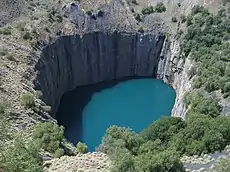United Nations Security Council Resolution 1459
United Nations Security Council resolution 1459, adopted unanimously on 28 January 2003, after recalling resolutions 1173 (1998), 1295 (2000), 1306 (2000), 1343 (2001), 1385 (2001) and 1408 (2002) concerning the illicit trade in diamonds, the Council expressed support for the Kimberley Process Certification Scheme (KPCS).[1]
| UN Security Council Resolution 1459 | ||
|---|---|---|
 | ||
| Date | 28 January 2003 | |
| Meeting no. | 4,694 | |
| Code | S/RES/1459 (Document) | |
| Subject | The Kimberley Process Certification Scheme | |
Voting summary |
| |
| Result | Adopted | |
| Security Council composition | ||
Permanent members | ||
Non-permanent members | ||
| ||
In the preamble of the resolution, the Security Council remained concerned at the connection between the illegal trade in rough diamonds and the fuelling of armed conflicts.[2] It highlighted the importance of conflict prevention and major diamond producing, trading and processing countries participating in the Kimberley Process. Furthermore, the contributions of industry and civil society to the development of the Scheme were appreciated.
The resolution expressed support for the Kimberley Process Certification Scheme and ongoing efforts to implement and refine the regime as an important contribution against the trafficking of blood diamonds.[3] It also welcomed the voluntary self-regulation system and stressed that the widest possible participation in the Scheme was essential.
See also
References
- "Security Council expresses strong support for 'Kimberley Process', aimed at halting illicit diamond trade used to fuel conflicts". United Nations. 28 January 2003.
- Gowlland-Debbas, Vera; Tehindrazanarivelo, Djacoba Liva (2004). National implementation of United Nations sanctions: a comparative study. Martinus Nijhoff Publishers. p. 24. ISBN 978-90-04-14090-5.
- "Security Council backs global certification scheme for rough diamonds". United Nations News Centre. 28 January 2003.
External links
 Works related to United Nations Security Council Resolution 1459 at Wikisource
Works related to United Nations Security Council Resolution 1459 at Wikisource- Text of the Resolution at undocs.org